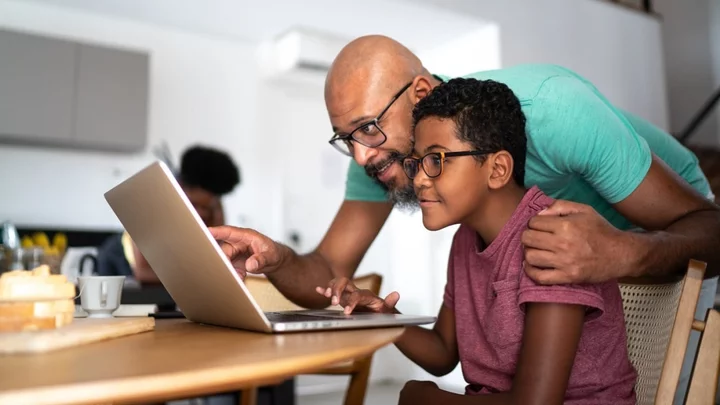You may remember life before the internet, but your kids don't. To them, internet access is as ubiquitous as fresh air—and nearly as important. Your children can find information and entertainment from anywhere in the world online. This unrestricted access can be both a convenience and a concern for parents.
If you're worried about keeping an eye on your kids in a modern, connected environment, you’re not alone. According to research, two-thirds of parents in the US believe parenting is harder today than it was 20 years ago, with technology being a major reason.
In the pre-online age, it was easier for parents to keep track of their kids' friends because they could see them all in person. Now kids may have close friends online, many of whom they'll never meet face to face. These virtual friends can still influence your kids' minds and actions all the same. Those friends also may not be who they say they are—a valid concern for parents.
Getting Started with Parental Control SoftwareIt’s up to you to teach your children smart habits when it comes to interacting online so they can make the right choices when left alone with an internet-connected device. I communicated with Ben Schmerler, director of strategic operations at DP Solutions, by email for this article. In addition to his day job, Schmerler also teaches children about online security. He explains some key points parents and kids need to know about online safety, security, and privacy.
1. Respect the Power of the Internet
The photos, videos, and words kids post on social sites today can haunt them tomorrow. Let your kids know it’s important to be smart about posting online and not to post anything they don’t want other people to see.
“While many websites talk about protecting your personal information or provide you with sharing settings, there's no guarantee that these tools keep your data protected from a breach," Schmerler cautioned. "Once you post something on Facebook or share something sensitive with a third party, don't be surprised if it ends up out there on the web, even if you didn’t intend it to.”
On the internet of today, people can lose reputations and even their jobs over things they posted 20 years ago—even things they deleted. Just because you delete a tweet, for example, doesn't mean it isn't still archived somewhere.
It's not just about protecting from the so-called "cancel culture." It's also about keeping them (and, by extension, your family, friends, and employer) financially and physically safe. If your kid posts photos showing their current location on Instagram while on that cool family vacation, they've just let the world, including criminals, know you're not home. If a child posts about a medical condition affecting them or a family member, then future insurance claims could be denied.
Once any of your data is public, it's beyond your control. Talk to your kids about the power and permanence of the internet, and consider it before sharing information online.
2. Don't Fall for Phishing Scams
“Before clicking a link or volunteering information, be absolutely certain you know exactly what you are doing and trust the source,” Schmerler warned.
Ensure you and your child aren't unwittingly volunteering information to a hacker by clicking a malicious link in an in-game chatbox or Discord, or by opening an email attachment and falling prey to a phishing attack. Phishers send emails that look like legitimate correspondence and rely on you to give up personal information like usernames and passwords so that they can commit follow-up attacks on your accounts.
3. Update Apps and Patch Browsers
It may take a few minutes out of your day, but updating the apps and browsers on your child’s device is critical to maintaining good online health. Bad actors count on people using unpatched devices, which are more vulnerable to attacks. Old, un-updated apps can be sold to a different company that may use the software for nefarious purposes. Delete apps that you or your child no longer use, and set your apps to update automatically on your child's device.
4. Remember: Nothing Is Free
Whether it's a free-to-play game or a free download, companies hope you or your child will offer up personal information to them in exchange for freebies. The company then resells your information or gets you to purchase in-game items. Schmerler explained, “The same goes for social media websites and other free-to-use resources on the internet. Most of these sites have a strategy to make money off of you, even if it’s not entirely clear how.”
Parental Control Services: An Overview of Top FeaturesYou might be surprised at how much data popular apps collect about you, both in the real world and online. A PCMag story on which apps collect the most personal data showed that Facebook and Instagram were noteworthy offenders, though they were by no means the only ones. Shadier freeware apps can gather truly astonishing amounts of data, following you online even when you aren't using the app in question. iOS and Android offer tools that can help you figure out what data you need to protect from apps.
5. Go Easy on the Screen-Time Limits
It is tempting for parents to crack down on screen time that isn't school-related, but kids often interact online, which is important for their development. The right amount of time spent online will vary from child to child, and you can manage screen time without being heavy-handed.
Apple, for example, has parental controls built into their devices, which can help you see how much time your kids spend in front of screens. Google and Microsoft also have free tools to help you manage your child’s screen time.
6. Learn to Research Information Sources
One of the internet’s strengths is the free exchange of ideas and media: Anyone can post anything online. Unfortunately, that means that anyone can post disinformation and present it as facts, too.
“One of the greatest things about the internet is the accessibility of connectivity and the sheer amount of information accessible with a simple Google search," Schmerler remarked. "The flip side of that accessibility is rampant misinformation as well as people trying to express bigoted and negative views.”
Kids need to realize early on that social media can spread half-baked thoughts and impulsive opinions just as fast and as far as real facts and the results of diligent research. Plenty of YouTube videos and Reddit threads with so-called influencers encourage you or your child to think and feel a certain way. Teaching your kids how to use critical thinking skills and do clear-minded research using verified sources online can help nip a great deal of misinformation in the bud. Encourage kids to consult vetted online learning sites where it makes sense, too.
7. Talk to Your Children
“Years ago, Myspace was the predominant social media platform," Schmerler noted. "Yahoo was a major competitor of Google for search traffic. Your connected child may love Minecraft now, but there’s always some new hot game or website that will supplant it."
The hot new game or social platform may be cold in a month or two, so try to talk to your kids about what they're doing online. Keeping up with kids online can be a full-time job. Most parental control apps can’t monitor social media posts very well, so establish open communication with your children as they navigate the online gaming and social spheres.
8. Respect Your Kids
The best parental control tool is common sense. Your kids probably know more about the tech they're using than you do, so show them you respect their knowledge. Installing invasive parental control software to spy on your kids doesn't do much to show that you trust them, and they can probably get around it. Taking a more hands-off approach can be scary, but it may do wonders for your relationship with your children.
If you choose to install parental control software, use it in cooperation with your kids. Go over some house rules with them, and let them talk to you about their wants and needs when it comes to internet access. Then take those discussion points and use them to help you choose parental control software. Some services we’ve tested take a more hands-off approach to monitoring kids, displaying a warning instead of a block when your kid tries to visit an inappropriate site or comes close to running out of screen time.
Top-Rated Parental Control Tools
Qustodio Review
3.5 GoodLocategy Review
3.5 GoodNorton Family Review
4.0 Excellent9. Encourage Creativity Online
The internet has broken down barriers to learning and achieving in many creative and technological fields. Nurture your teen’s passions by helping them establish a professional presence in front of an online audience. That may mean encouraging them to make TikTok or YouTube videos, start a blog or podcast, and even contribute content to online news sources.
That said, putting themselves in front of an audience of potentially hostile strangers can be scary. Let your teenager know about the potential dangers they face when they offer themselves and their work up for criticism by an anonymous audience, and let them decide whether they are still interested in sharing their work online.
10. Spend Some Time Offline
Go outside. Unplug the video game console, let the computer run its updates, and disconnect from the online world for a few hours or a few days. A camping trip with no Wi-Fi may give you time to get to know your kids better. You also get to show your kids what the world was like before the internet. Who knows? They may even prefer the old-school, analog life.
For advice on how to consciously uncouple from your tech, check out It's Time to Digital Detox: How to Put 6 Feet Between You and Your Tech.









